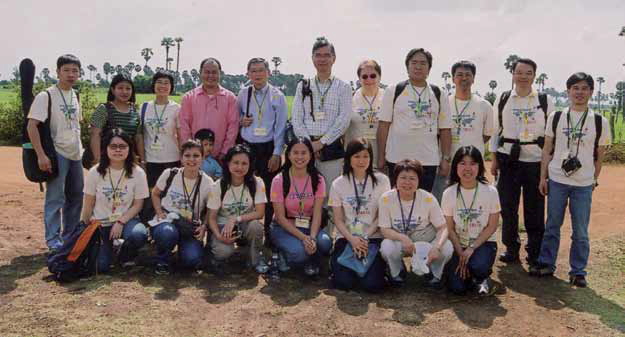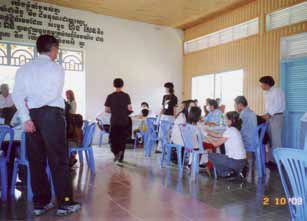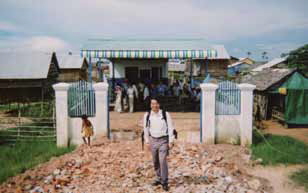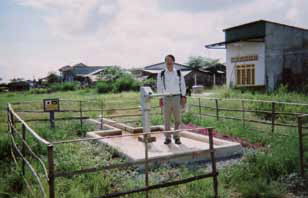© Hong Kong Academy of Medicine. CC BY-NC-ND 4.0
DOCTOR FOR SOCIETY
On curing poverty through health: Dr Fai-to Yau’s gift of volunteering
Kenny KH Chan1; Shadow YK Ng2; Vivian WC Yim2
1 Year 4, Faculty of Medicine, The University of Hong Kong
2 Year 4, Faculty of Medicine, The Chinese University of Hong Kong
Poverty is more than a monetary problem. Financial
aid, at best, is merely a plaster on the complex
socio-economic issue. Although a multi-pronged
approach is warranted to alleviate poverty, Dr Yau
has recognised one of the keys to curing poverty: to
tackle the underlying health inequality that denies
children the opportunity to thrive. As an avid
advocate for child health and well-being, he ponders
how he can expand his efforts to relieve the suffering
of children.
As a Consultant in Paediatrics and Adolescent
Medicine at Alice Ho Miu Ling Nethersole Hospital,
Dr Yau works tirelessly to advance child health
care and serves as Councillor of Management
of the Hong Kong Children’s Kidney Fund. A
bespectacled man with a fatherly grin, he sits at
his desk that is strewn with newspaper clippings,
stacks of paediatrics journals, and photographs of
past travels. In a reserved corner rests a porcelain
plaque that is treasured by Dr Yau. Inscribed with
the biblical verse: “To act justly and to love mercy
and to walk prudently with your God” (Micah 6:8),
it is a keepsake that constantly reminds him of the
quintessential core values in caring for the sick.
Dr Yau’s lifelong devotion to patient care was
borne from his personal experience with adversity as
a teenager, and his dedication to the Christian faith.
During his adolescence, his family was plunged into
financial hardship by the illness of his father, the
sole breadwinner. To help alleviate the burden to
the family, he had to work part-time to make ends
meet. He also derived from his faith the epiphany of
devoting himself to patient service and humanitarian
aid. Since 2003, with the support of the Chinese
Rhenish Church Hong Kong Synod Mission, Dr Yau
and other volunteer doctors, dentists, and health
professionals have continually ventured into rural
Cambodia and launched various health initiatives
for impoverished communities. They have operated
makeshift medical clinics in remote areas that are
hardly accessible, hoping to salvage the dire situation
of inadequate and unaffordable health care in some
of the poverty-stricken villages.
Dr Yau knows full well, from his first-hand
experience of on-site consultations in Cambodia,
that poverty deprives one not only of health but also
of his/her aspiration. Knowing the effects of ill health
on a child’s physical and psychomotor development,
he reflects on the far-reaching repercussions of
poverty on individuals as well as communities. He
recounts his experience of a clinical consultation
for an anaemic mother and daughter during one
of his visits. “While both the mother and the
daughter are obviously anaemic, there was no way
to confirm whether it was caused by thalassaemia or
iron-deficiency anaemia without any sophisticated
diagnostic equipment. Both diseases can co-exist.
The only thing I could do, given the circumstances,
was to prescribe iron supplements, and hope that it
would be of help”, Dr Yau laments. “Knowing that
anaemia impairs psychomotor development, I was
concerned that a health issue could aggravate a
social issue, by means of hindering them from social
mobility and hence perpetuating the vicious cycle of
poverty”, he remarks. Indeed, it is not uncommon to
see poverty passing on from generation to generation.
How can the curse of perennial poverty be broken when children are denied the fundamental right to good health and the ability to fully thrive, strive, and aspire?
The similar plight of countless Cambodia households has been his motivation to pay frequent return visits. While government initiatives are necessary to address the issue of health inequality, Dr Yau and many of his comrades emphasise the significance of individual contributions. Dr Felipe Castro, a Filipino missionary doctor whom he met during one such visit, has impacted on his view of humanitarian missions. “Dr Castro has been working with his wife in Cambodia for more than 15 years and has aspired to build a hospital in order to provide affordable health care for the locals. His commitment to serving the underprivileged is very admirable and that’s what inspires me to side with him and keep supporting this cause”, says Dr Yau, rejoicing at their recent success in establishing the desperately needed hospital in a rural village of Kampong Thom Province.
“It goes without saying how exhausting it was after each clinic session, mostly owing to the tropical weather; but I would be filled with joy after seeing how reassured the patients became”, says Dr Yau as he recounts his consultation sessions. “The satisfaction derived from attending patients in Cambodia simply cannot be expressed in words. Our volunteer doctors were held in high regard among the villagers. Some patients would even bow to the doctors to express their gratitude. There, the greatest reward earned by our healing hands was the unforgettable smiles on the patients’ face.” In all his work, Dr Yau endeavours to embody holistic care and live up to the noble heritage of medicine—caring for both the mind and body with compassion.
Summing up his volunteer efforts, Dr Yau shares with our readers his enlightened philosophy of our daily living as well as medical practice. “Each and every opportunity I have taken part in brought me great delight. I learnt to be grateful for things we take for granted—safe shelter, clean water, a full belly, and affordable health care.” He also reminds medical students and junior doctors that there is no substitute for a set of well-honed clinical skills, and that diagnostic tools, while important, should not be overly relied upon. “The setting of rural clinics is very different from that of our daily practice. These visits reaffirmed my belief that solid skills in physical examination and clinical acumen are prerequisites to excellent medical practice. When there is no diagnostic facility to back us up, all we rely on is our bare hands, experience, and teamwork.”
The inspirational visits to Cambodia convince Dr Yau that participation in humanitarian relief enriches not only the livelihood of the takers but also the givers. Every visit has faithfully opened up
new vistas for both his mind and soul, allowing him to appreciate the world through the lens of empathy and compassion. “Compassion is the best potion. A small gesture of human touch and understanding is just as potent as the best medicine, if not more, in assuaging patient’s worries.”
“We are blessed with the privilege to help others; that is the greatest reward we are endowed with in life.” As Dr Yau is happily embracing his upcoming retirement, his zeal to continue improving the health and livelihood of Cambodian people has never been greater.

Smiles around as Dr Yau (back row, second from right) shares a beautiful memory with a group of dedicated volunteers from Hong Kong, Germany, and Cambodia

A morning at the make-shift ‘out-patient clinic’ conducted by Hong Kong and local Cambodian volunteers



